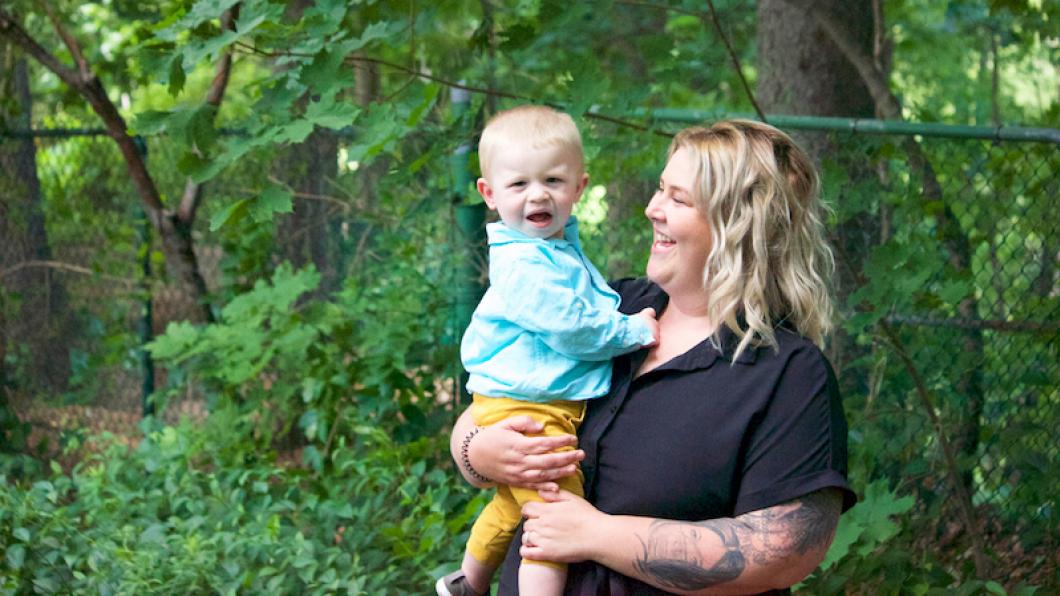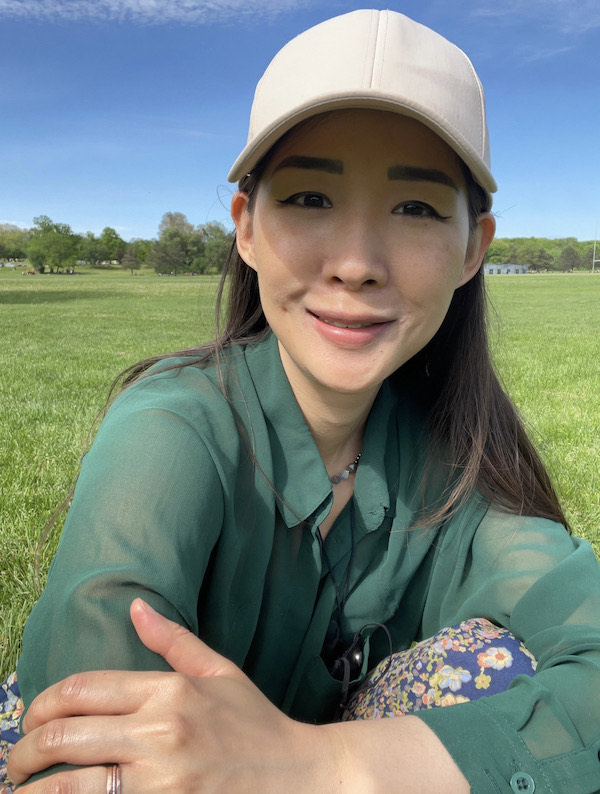
In spiritual care, 'suffering needs to be touched and held tenderly'
By Louise Kinross
Kiersty Xavier is Holland Bloorview's spiritual care provider. On Tuesdays and Thursdays she is available to talk to children and parents on our inpatient units. "She was like a ray of light," says Koren Thurston (photo above), whose son Vince came to Holland Bloorview for rehab after brain surgery to treat seizures. "Kiersty has this calming presence that makes it incredibly easy to talk about your daily worries as a parent with an inpatient child, as well as life beyond Bloorview. She validated my fears, concerns and honesty. I tried to learn and grow from every obstacle and defeat, as well as triumphs. I know I would not have this positive perspective on our life moving forward without Kiersty’s guidance and pure love." BLOOM spoke with Kiersty about her role.
BLOOM: How did you get into this field?
Kiersty Xavier: I’ve always considered myself a spiritual person. Since I was a child I’ve had a deep longing to connect with others on a soulful level. My father passed away when I was very young. I felt alone in facing that trauma. I felt there wasn't a place for me to express sadness or grief in the playground or in the school hallways.
Part of me felt invisible. I felt I had to hide that sadness for a very long time, until my spiritual journey invited me to heal and widen my path. I wanted to explore the theology of love through a lens of faith and hope, and that's what led me to study a master's of Theological Studies at Knox College at the University of Toronto.
I didn't even know what spiritual care was until a mentor of mine introduced me, and it was like I'd arrived where I felt I was meant to be my whole life. I completed my first Clinical Pastoral Education at Sunnybrook Health Sciences Centre. The irony was I didn't know what I was getting myself into, in the same way I know many clients and parents here don't know what spiritual care is.
It's an encounter and a relationship.
BLOOM: Can you tell us more?
Kiersty Xavier: It's caring for the human spirit and we do that by providing a nurturing space to explore one's identity, meaning and purpose. Spiritual care is about giving voice to the rich inner world of a person's thoughts, feelings and emotions. It could be grief or suffering, gratitude, fear and joy. Some of those emotions readily come to the surface while others lay buried deeper within.
BLOOM: Do you have to have specific religious beliefs to participate?
Kiersty Xavier: No. It's for anyone, it's for every human being. It doesn't matter if you're religious or non-religious. It's about having a desire to want to unburden your story.
BLOOM: What is a typical day like?
Kiersty Xavier: Spontaneous and serendipitous.
Many times I’ll show up and parents and staff will ask me: 'Oh, did someone tell you I was here? I wanted to talk to you.' There's that serendipity where it seems like I arrive at the right place at the right time, and that also creates an instant connection.
For example, one day I noticed the door was open in one room and the lights were off and the parent was sitting by the window. I gently called out to her and introduced myself and asked 'How are you doing?' and she turned around and had tears streaming down her face. That created an opening for a soul talk with her, and from then on I provided ongoing spiritual companionship to her.
Another time I saw a teenage girl at the elevator. She was recovering from an accident. I introduced myself and said I was a spiritual care provider and she said enthusiastically 'Oh, I'm spiritual!' I asked her if she wanted to talk and she said: 'I know we just met, but I have so much to tell you.' I was so touched by her readiness to open up and look within.
I receive referrals at morning huddle and I update staff on the kids and families I see. I do have some scheduled appointments, but I also do walk-about rounds where I introduce myself to families on the units. I intentionally try not to schedule too many appointments because spiritual care is about going with the flow and being present to what’s unfolding in the here and now. It's organic.
BLOOM: What's the greatest challenge or your role?
Kiersty Xavier: Personally, there are definitely moments where I feel a sense of helplessness and my heart hurts. When I re-centre myself, I'm reminded that I can't motivate the pain and suffering out of anyone, including myself. Suffering needs to be touched and held tenderly. And healing is so much more than fixing. Healing starts with our presence.
Many times clients and families ask existential questions that none of us have the answers for. Many of the things that happen in life don't have explanations. We must feel beyond the explanation and touch the reality of the soul's expression.
For a lot of people, the spiritual journey is about being your authentic self. One of the goals of spiritual care is to invite others to be seen. I believe, on some level, that everyone wants to be seen and heard and acknowledged. But in order to show up and be seen, we need to remove the barriers that get in the way of our own authentic self. As human beings, we often create obstacles to that kind of intimacy.
BLOOM: Because in our culture, there's a lot of pressure to portray a certain image of ourselves? Or we tend to reward the expression of certain emotions, but not others?
Kiersty Xavier: Yes. People think of emotions in terms of positive and negative. Spiritual care does away with that duality. All emotions are valuable and can teach us more about ourselves.
BLOOM: What's the greatest joy of your role?
Kiersty Xavier: Experiencing attunement with another human being regardless of their age, gender, race, religion, or ethnicity. That gives me so much joy. Children are deeply spiritual. They don't have the same filter as adults. One teenage client described spiritual care as an invisible string connecting our hearts together.
BLOOM: What emotions come with the job?
Kiersty Xavier: People might be surprised, but I'd say laughter and joy. I find laughter is a gift that can take a person out of themselves and their circumstances, even for a moment, and create a sense of trust with the person that you're laughing with. I find that tends to become an opening for me to develop a deeper spiritual care relationship with a person. Joy and sorrow for sure. They both draw from the same well.
I personally don't know joy without experiencing sorrow in my life, and joy doesn't mean that everything will be happy, but it means that this journey is worthwhile. I don't think there's a one-size-fits-all to healing. But the beginning often starts with a conscious opening of the heart, the mind, the body and the spirit, to make room for the spaciousness of love, forgiveness and hope.
BLOOM: Do you do anything specific to help cope with stress?
Kiersty Xavier: I’m an empath so I absolutely need alone time and solitude. Have you heard of the Croatian word fjaka? It translates to the art of doing nothing, but it's not the equivalent of being lazy. I embrace that for my own self-care. It's being saturated with the fullness of quietude and stillness and rest with no other wants. I shut off and let go. It's restoring.
BLOOM: What are the most common reasons children or parents seek you out?
Kiersty Xavier: There's no one particular reason. It could be grief or fear or anxiety, but also gratitude or joy. Often a person has a readiness to look within. Spiritual care encourages people to embrace the emotional space that they find themselves in. As human beings, we feel an immensity of emotions. Yet we also have a propensity to make ourselves small or hide from our emotions, and from each other.
I learn from my sadness, I listen to what my fear has to tell me, and I gain courage from my anger that helps me decide what to do. My emotions are my internal compass, but in many ways, I feel we're taught to be disconnected. I felt ashamed of my own sadness as a child.
BLOOM: When people express sadness, we often tell them 'Don't be sad.'
Kiersty Xavier: We often try to diminish sadness in others because we don't want to feel a sense of helplessness in ourselves.
Spiritual care helps me to feel comfortable with, and connect to, my own fear and sorrow and pain and joy, so I can then connect to another human being.
I remember a patient I saw at a different hospital said 'I have all these cheerleaders around me, telling me "You're the strongest person I know," but sometimes I don't want to be strong. I don't want to live up to other people's expectations that I'm superhuman when I'm in pain and feeling crappy. Let me feel crappy, without feeling guilty about it.'
Spiritual care is about returning to yourself.
Inpatient families who would like to speak with Kiersty can reach out to their nurse or social worker for a referral.
